|
|
|
Sort Order |
|
|
|
Items / Page
|
|
|
|
|
|
|
| Srl | Item |
| 1 |
ID:
173968
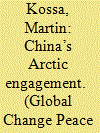

|
|
|
|
|
| Summary/Abstract |
Environmental changes in the Arctic region attract global attention. China, with its growing power, has been steadily increasing its presence in the region and in January 2018 published its first Arctic policy paper. At the same time, there are numerous actors within China that are interested in the Arctic and have the capacity to influence China’s Arctic decision-making process. However, what is less clear, is how China’s Arctic policy is being formulated across the Chinese government and what role different subnational actors play in its formulation and implementation. This research seeks to fill this gap. Drawing on fieldwork and Chinese texts, this study aspires to further develop our understanding of the workings behind Chinese state policy formation.
|
|
|
|
|
|
|
|
|
|
|
|
|
|
|
|
| 2 |
ID:
173971
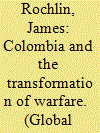

|
|
|
|
|
| Summary/Abstract |
After nearly two centuries at war with itself, Colombia witnessed an opportunity for peace in 2016 when the government reached a celebrated agreement with the leftist rebels of the Fuerzas Armadas Revolucionarias de Colombia (FARC). Three years down the road, the peace agreement has frayed, and the aura of hope that initially surrounded it has depleted. Colombia now faces a transformation of warfare marked by what appears to be an ‘end of ideology’. That is, rather than pursuing ideational goals for the achievement of a better society, the country’s diverse array of armed groups appears to be fighting primarily for the maximisation of wealth and territory. We shall begin with a conceptual discussion, and then turn to the historical context of Colombian security. This will be followed by an analysis of the elements that led to the demise of the FARC, and to the proliferation of an assortment of illegal armed groups that dot the landscape of Colombia’s transformation of war.
|
|
|
|
|
|
|
|
|
|
|
|
|
|
|
|
| 3 |
ID:
173969
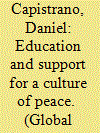

|
|
|
|
|
| Summary/Abstract |
In this article, we discuss the relationship between formal education and public support for a culture of peace, defined here as values and attitudes related to key aspects of peace, such as tolerance, respect and non-violence. For that, we analyzed individual and country-level data from the World Values Survey (WVS) arguing that such data provides relevant evidence to the field of peace studies, and can contribute to explore complex relationships between education and outcomes that are difficult to measure cross-culturally, such as attitudes towards peace. We constructed an index to measure attitudes towards positive peace using WVS items, which reveals significant disparities between countries. We then explored the relationship between this variable and levels of formal education at individual and national levels. We found considerable differences in countries’ levels of tolerance and respect as well as aversion to violence, which is related to education attainment in almost all countries analyzed.
|
|
|
|
|
|
|
|
|
|
|
|
|
|
|
|
| 4 |
ID:
173970
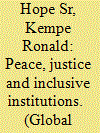

|
|
|
|
|
| Summary/Abstract |
The SDGs are intended to be universal, in the sense of global applicability. Goal 16 of the 2030 Agenda for Sustainable Development is officially titled: ‘Promote peaceful and inclusive societies for sustainable development, provide access to justice for all and build effective, accountable and inclusive institutions at all levels’. This article provides an analysis of the importance of SDG 16 to achieving all of the SDGs, the progress on implementation of SDG 16 to date, the principal challenges that countries are encountering in the implementation of SDG 16, and proposes a set of policy solutions to overcome those challenges. It argues that progress on SDG 16 is critical to progress on the other SDGs and, therefore, it is imperative that countries vigorously attempt to overcome those challenges to meet the targets indicated for each goal. It draws on country experience as well as on the author’s own field experience.
|
|
|
|
|
|
|
|
|
|
|
|
|
|
|
|
| 5 |
ID:
173967
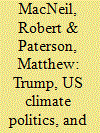

|
|
|
|
|
| Summary/Abstract |
This paper argues that the Trump administration’s position on climate change should be understood more in terms of continuity than disjuncture. It develops this argument in four principal ways. First, it situates Trump in the US’s paradoxical relationship to the UNFCCC, as a would-be leader that struggles to commit itself to substantive action, and the evolving geopolitics within the UNFCCC. Second, the paper focuses on an on-going struggle between pro-fossil fuel interests and a ‘decarbonising’ bloc, interpreting Trump (like George W. Bush) as a pro-fossil fuel backlash. Third, it explores the pattern of climate politics within the US, where stalemate in Congress has been often offset by action at the state, city, and corporate levels. Fourth, it should be understood in relation to the emergence of a ‘global climate governance complex’, where the UNFCCC has to be understood in relation to multilevel and transnational governance initiatives on climate change.
|
|
|
|
|
|
|
|
|
|
|
|
|
|
|
|
|
|
|
|
|